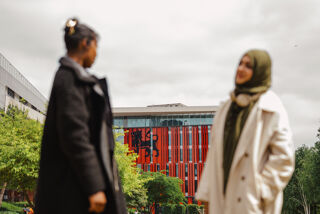PhD candidate, Christiana, explores themes encountered at a research conference covering "The Hidden Lives of PGRS".
"When people consider doing a PhD, they often imagine being endless academic work and countless hours of research. However, with the generous support of Birmingham City University, I had the opportunity to attend the UKCGE Annual Conference 2025 and its pre-conference event, “The Hidden Lives of PGRs,” held at the University of Glasgow. As a part-time, self-funded, fourth-year PhD candidate researching social prescribing and health inequalities, this experience was not only professionally enriching but also personally validating.
If you’re thinking about doing a PhD, these insights from my experience could provide useful guidance to help you get started.
Resonating with realities of doctoral study
The pre-conference event, designed by and for postgraduate researchers, created a brave, open space for sharing the unspoken realities of doctoral study. Presentations about navigating disability, parenting, neurodivergence, grief, and identity resonated deeply with me. These reflections challenged deficit models of student experience and reframed the “hidden curriculum” as a source of resilience, relational insight, and community power. I left that space feeling seen, affirmed, and empowered.
The main conference, titled “Transitions and Transformations in Postgraduate Education,” brought together academics, policy leads, and post graduate researchers to reflect on how doctoral education must evolve in response to social, technological, and institutional shifts. The keynote session was on open research resonated with me, it highlighted both the challenges and the transformative potential of accessible, transparent academic publishing.
Open Research and Breaking Barriers
I felt a real sense of pride in my BCU supervision team, Professor Judith Dyson and Dr Kate Thomson, who encouraged and supported me to publish my first peer-reviewed article through an open access journal. My paper, “The Role of Social Prescribing Interventions in Addressing Health Inequalities in the United Kingdom: A Narrative Review” was published in April 2025 with publishing support from the University. As a Black woman and first-generation university student in my family, publishing during my PhD felt like shattering a glass ceiling and it’s one of the reasons I chose BCU, a university whose commitment to equity, diversity, and inclusion aligns with my values. I encourage other post graduate researchers to speak with their supervisors about open research publishing, plan for their outputs, and be proactive. Remember, supervisors are supportive but busy, and the PhD is your independent project.
PhD is more than just academic work
This conference was a timely reminder that doctoral education is more than an academic process, it’s a personal and transformative journey. As PhD students, we need to ask ourselves: who are we becoming as a result of this experience, and what is the nature of that transformation? It also reminded me that post graduate researchers and universities like BCU have a shared role in shaping the holistic journey.
I’ll admit, I often ignore surveys or skip events and don’t read emails form the doctoral college due to being part-time, work commitments and daytime scheduling. But the “hidden curriculum” highlights that informal learning, community, and engagement are all part of the PhD process.
What's next?
Inspired by the conference, I’ve now signed up for the University’s postgraduate research writing retreat for an opportunity to write, reflect, enjoy the sunshine, and meet other post graduate researchers. It isn’t just about passing the viva; it’s about growing through the process and looking after our wellbeing- PhD has to be holistic!
I am also planning to check out the 'Hidden Curriculum' book in the library, recommend it to fellow post graduate researchers, supervisors, and the Doctoral College. It might be a great idea for the Doctoral College or postgraduate representatives to organise a reading group around it.
Our needs change throughout the life cycle, and so must the support we seek and give. Be strategic and access support that will help your journey for the cycle that you are in and be aware of support offers for when you are at that cycle or stage."





